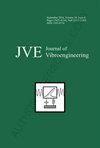Convolutional neural network intelligent fault diagnosis method for rotating machinery based on discriminant correlation analysis multi-domain feature fusion strategy
IF 0.7
Q4 ENGINEERING, MECHANICAL
引用次数: 0
Abstract
Aiming at solving the problems of limited training data, single input information, and limited diagnostic accuracy under the influence of strong background noise in fault diagnosis of rotating machinery, this paper proposes a fault diagnosis method based on the combination of discriminant correlation analysis (DCA) and convolutional neural network (CNN). Firstly, the original vibration signal is divided into several segments in the time domain, and the training data is directly processed by one CNN branch to extract multi-scale time domain features. Simultaneously, the divided data is subjected to discrete wavelet transform (DWT), and processed by another branch of CNN to extract multi-scale time-frequency features. Then, the DCA feature fusion mechanism is adopted to fuse the two-domain features extracted in the parallel branches to improve the model’ detection ability. Finally, the fused features are input into the deep CNN for training and learning to extract new features and output the classification results. Through the experimental analysis of two different types of data, the results show that the proposed method can be used for fault diagnosis of rotating machinery effectively. Compared with the single CNN network, the proposed method combines the multi-domain multi-scale feature extraction module with the DCA feature fusion module to enrich the feature information extraction ability. At the same time, the network performance is improved to get higher fault classification accuracy higher.基于判别相关分析多域特征融合策略的卷积神经网络旋转机械智能故障诊断方法
为了解决旋转机械故障诊断中训练数据有限、输入信息单一、强背景噪声影响下诊断精度有限等问题,本文提出了一种基于判别相关分析(DCA)和卷积神经网络(CNN)相结合的故障诊断方法。首先,将原始振动信号在时域上划分为若干段,由一个 CNN 分支直接处理训练数据,提取多尺度时域特征。同时,对分割后的数据进行离散小波变换(DWT),并由 CNN 的另一个分支进行处理,以提取多尺度时频特征。然后,采用 DCA 特征融合机制将并行分支中提取的双域特征进行融合,以提高模型的检测能力。最后,将融合后的特征输入深度 CNN 进行训练和学习,提取新的特征并输出分类结果。通过对两种不同类型数据的实验分析,结果表明所提出的方法可以有效地用于旋转机械的故障诊断。与单一的 CNN 网络相比,所提出的方法将多域多尺度特征提取模块与 DCA 特征融合模块相结合,丰富了特征信息提取能力。同时,改进了网络性能,从而获得更高的故障分类精度。
本文章由计算机程序翻译,如有差异,请以英文原文为准。
求助全文
约1分钟内获得全文
求助全文
来源期刊

Journal of Vibroengineering
工程技术-工程:机械
CiteScore
1.70
自引率
0.00%
发文量
97
审稿时长
4.5 months
期刊介绍:
Journal of VIBROENGINEERING (JVE) ISSN 1392-8716 is a prestigious peer reviewed International Journal specializing in theoretical and practical aspects of Vibration Engineering. It is indexed in ESCI and other major databases. Published every 1.5 months (8 times yearly), the journal attracts attention from the International Engineering Community.
 求助内容:
求助内容: 应助结果提醒方式:
应助结果提醒方式:


